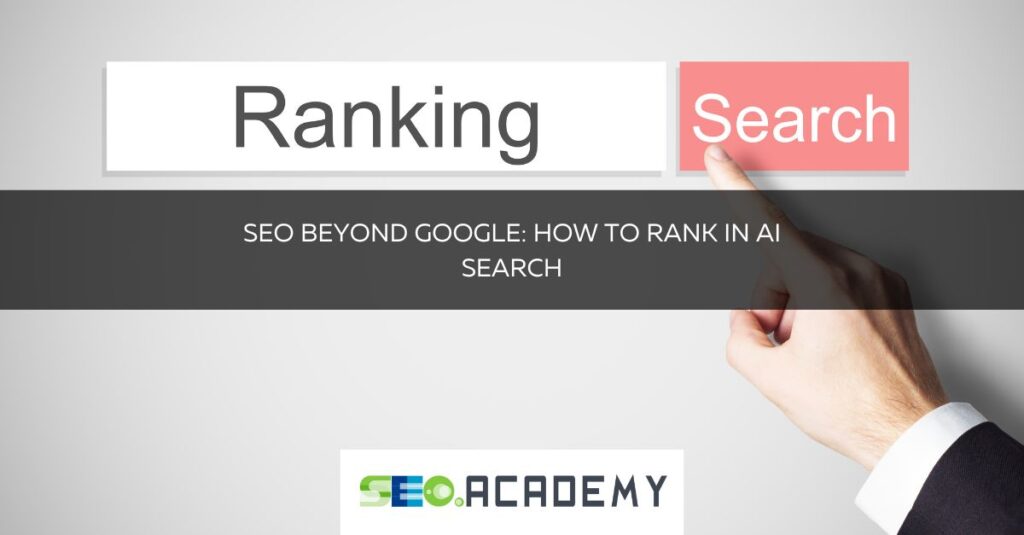For decades, search engine optimization has been synonymous with one name: Google. Marketers have dedicated countless hours to understanding its algorithms, mastering keyword research, and climbing the ranks of its search engine results pages (SERPs). But the landscape is shifting. With the rise of powerful AI tools like Gemini, ChatGPT, and Perplexity, the very definition of “search” is expanding — giving rise to a new discipline known as AI Search Optimization.
These AI assistants are becoming the go-to resource for users seeking direct, conversational answers. Instead of sifting through a list of blue links, people are getting immediate, synthesized information. This change presents a new frontier for digital marketers. If your content isn’t optimized for these AI platforms, you risk becoming invisible to a growing segment of your audience. This guide will explain how to adapt your SEO strategy for this new era, ensuring your brand remains visible and authoritative wherever users are searching.

What is AI Search Optimization?
AI search optimization is the process of creating and structuring your content so that AI language models can easily find, understand, and use it to answer user queries. While traditional SEO focuses on signaling relevance to search engine crawlers through keywords and backlinks, AI search optimization prioritizes clarity, context, and directness.
Think of it this way: when a user asks an AI chatbot a question, the model scours its vast database of information to construct the most accurate and helpful response. It often cites its sources, linking back to the original content. Your goal is to make your content the most reliable, comprehensive, and easily digestible source available, making it a prime candidate for citation. This not only drives referral traffic but also establishes your brand as an authority in the AI-powered ecosystem.
How to Optimize Content for AI Search Engines
Adapting your strategy for AI search doesn’t mean abandoning everything you know about SEO. Many core principles still apply. However, there are specific tactics you need to adopt to increase your chances of being featured in AI-generated answers.
1. Focus on Direct Answers and Clarity
AI models are designed to provide immediate solutions. They look for content that answers questions clearly and concisely. To optimize for this, you should structure your content to be as direct as possible.
- Use Question-Based Headings: Frame your H2s and H3s as questions that your target audience is likely to ask (e.g., “What Is AI Search Optimization?”). This makes it easy for AI models to match your content to specific queries.
- Provide Concise Summaries: Start sections with a brief, clear summary of the information that follows. This “inverted pyramid” style of writing, with the most important information at the top, helps AI quickly grasp the core message.
- Write in Plain Language: Avoid jargon and overly complex sentences. Aim for a high readability score (a Flesch reading-ease score of 60 or higher is a good target). Content that is easy for a human to understand is also easy for an AI to process.
2. Prioritize Structured Data and Schema Markup
Structured data, or schema markup, is code you add to your website to help search engines understand your content’s context. For AI models, it’s like providing a detailed map of your information. It explicitly tells them what your content is about, making it easier to pull accurate details for answers.
- Implement FAQ Schema: If you have a frequently asked questions section, use FAQPage schema to mark up the questions and answers. This makes your content a perfect source for AI-powered Q&A sessions.
- Use “HowTo” and “Article” Schema: For instructional posts, “HowTo” schema breaks down the steps, making it simple for an AI to generate a step-by-step guide. “Article” schema helps identify key elements like the author, publication date, and headline, which builds credibility.
- Organize Data in Tables and Lists: Presenting data in well-structured tables and bulleted or numbered lists makes it scannable for both humans and AI. This format allows models to easily extract specific data points to support their answers.
3. Build Authority and Provide Context
AI models prioritize information from sources they deem trustworthy and authoritative. While the exact signals are still evolving, they share many similarities with Google’s E-E-A-T (Experience, Expertise, Authoritativeness, and Trustworthiness) guidelines.
- Emphasize Expertise: Clearly state the author’s credentials and experience. An author bio that highlights relevant expertise can signal to AI that the content is reliable.
- Cite Your Sources: Link out to reputable studies, reports, and original sources. This not only builds trust with your audience but also demonstrates to AI that your information is well-researched.
- Create Comprehensive Content: Cover a topic in depth. Instead of creating several small articles, build a comprehensive resource that answers multiple related questions. This positions your content as a one-stop-shop, making it a valuable source for AI models to cite.
4. Target Conversational and Long-Tail Keywords
The way people interact with AI assistants is fundamentally different from traditional search. Queries are more conversational and specific. Users are more likely to ask “What are the best SEO strategies for a small business in 2024?” than to type “SEO small business.”
- Think in Full Sentences: Your keyword research should focus on the full questions your audience is asking. Use tools like AnswerThePublic or browse forums like Quora and Reddit to find these conversational queries.
- Address User Intent: Go beyond the literal question and consider the underlying intent. If someone is asking how to create a capsule wardrobe, they might also want to know about the benefits, where to shop for basics, and how to choose a color palette. Addressing these related topics makes your content more valuable.
The Future of Search Visibility
Optimizing for AI search engines isn’t about replacing your current SEO efforts; it’s about augmenting them. The goal is to build a robust content strategy that ensures your brand is visible no matter how people are searching for information. By creating clear, well-structured, and authoritative content, you position your brand for success in both traditional SERPs and the new wave of AI-powered search.
Understanding the best practices and effective strategies is key to navigating this evolving landscape. If you are looking to deepen your knowledge, SEO Academy offers online courses on SEO and digital marketing. Created by leading experts in the field, these courses allow you to learn at your own pace and master the skills needed to thrive in the modern digital world.

